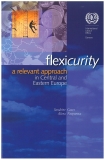Publications on Wages
January 2007
-

Publication
Flexicurity: A relevant approach in Central and Eastern Europe
25 January 2007
This book argues, with case studies contributed by outstanding national experts, that the flexicurity approach is the most relevant for Central and Eastern European countries and suggests appropriate reforms of economic policy, institutional framework of the labour market, labour market policy and education and social policies in this region.
-
Publication
Yearbook of Labour Statistics, CD-ROM Multi-user - 2007
14 January 2007
Sources and Methods: Labour Statistics, Volumes 1-10 - Published annually
-
Publication
Yearbook of Labour Statistics, CD-ROM Single-user - 2007
14 January 2007
Sources and Methods: Labour Statistics, Volumes 1-10 - Published annually
-
Publication
Occupational Wages and Hours of Work and Retail Food Prices, CD-ROM Multi-user - 2007
14 January 2007
Statistics from the ILO October Inquiry - Published annually
-
Publication
Occupational Wages and Hours of Work and Retail Food Prices, CD-ROM Single-user - 2007
14 January 2007
Statistics from the ILO October Inquiry - Published annually
-
Publication
Occupational Wages and Hours of Work and Retail Food Prices - 2007
14 January 2007
Statistics from the ILO October Inquiry - Published annually
October 2006
-
Working paper
A Comparative Analysis of Promoting Pay Equity: Models and Impacts
01 October 2006
The variety of causes leading to gender inequalities in pay makes it apparent that no single policy measure is sufficient to reduce them. A set of interventions that simultaneously address each cause of the gender pay gap is necessary. Job evaluation methods help tackle discrimination in remuneration by comparing and establishing, on the basis of objective criteria, the relative value of two different jobs. Job evaluation helps to determine when two jobs that differ in content are of “equal value” and, thus, entitled to equal remuneration.
January 2006
-
Publication
Yearbook of Labour Statistics, CD-ROM Multi-user - 2006
14 January 2006
Sources and Methods: Labour Statistics, Volumes 1-10 - Published annually
-
Publication
Yearbook of Labour Statistics, CD-ROM Single-user - 2006
14 January 2006
Sources and Methods: Labour Statistics, Volumes 1-10 - Published annually
-
Publication
Occupational Wages and Hours of Work and Retail Food Prices, CD-ROM Multi-user - 2006
14 January 2006
Statistics from the ILO October Inquiry - Published annually